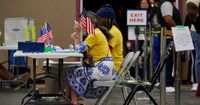The U.S. Justice Department is quietly amassing what experts say is the largest national voter roll database in American history, a move that has sparked a fierce debate over privacy, federal overreach, and the future of election integrity. In recent months, the Department’s Civil Rights and Criminal Divisions have requested voter registration data from at least 30 states, including both Republican strongholds like Texas and Mississippi and swing states such as Pennsylvania and Nevada, according to reporting by Reuters and The New York Times.
The effort, which officials say is aimed at rooting out ineligible voters—including noncitizens and felons—has alarmed voting rights advocates and state officials across the political spectrum. At its core, the initiative seeks to collect not only names and addresses but also sensitive identifiers like driver’s license numbers and the last four digits of Social Security numbers. The Justice Department plans to run this data against federal immigration and law enforcement databases, with the stated goal of ensuring that only eligible voters participate in federal elections.
According to Reuters, Homeland Security Investigations (HSI), a branch of the Department of Homeland Security, is expected to play a central role by cross-referencing voter rolls with other law enforcement data for criminal and immigration-related probes. This marks a significant shift in the federal government’s approach to election oversight, as previous Republican and Democratic administrations have largely left voter list maintenance to the states, wary of potential abuse and the appearance of federal overreach.
“Nobody has ever done anything like this,” said Justin Levitt, an election law expert at Loyola Marymount University’s law school and a former Justice Department official, in an interview with The New York Times. Levitt described the move as “wading in, without authorization and against the law, with an overly heavy federal hand to take over a function that states are actually doing just fine.” He added, “It’s wildly illegal, deeply troubling, and nobody asked for this.”
The Justice Department, for its part, insists it is acting within its statutory authority. In a statement to Reuters, a department spokesperson said, “The recent request by the Civil Rights Division for state voter rolls is pursuant to that statutory authority, and the responsive data is being screened for ineligible voter entries.” Gates McGavick, another DOJ spokesperson, told The New York Times that enforcing the nation’s elections laws is a priority, citing the National Voter Registration Act and the Civil Rights Act as the legal basis for obtaining the data. “Doing so will ensure that states have proper voter registration procedures and programs to maintain clean voter rolls containing only eligible voters in federal elections,” McGavick said.
Yet the scope and nature of the requests have raised eyebrows. In an August 28, 2025, virtual meeting with secretaries of state, senior Civil Rights Division official Michael Gates confirmed that all 50 states would eventually receive similar requests, specifically asking for the last four digits of every voter’s Social Security number. According to meeting notes reviewed by The New York Times, Gates pledged that the department would “securely and discreetly” analyze the data and provide confidential feedback to states.
Many states, however, are pushing back. Nearly every state has resisted turning over private, personally identifiable information, and some have outright refused to comply. The general counsel for Minnesota’s Secretary of State, Justin Erickson, wrote in a letter last month that the DOJ “did not identify any legal basis in its June 25 letter that would entitle it to Minnesota’s voter registration list. Nor did it explain how this information would be used, stored, and secured.” He added, “Equally concerning is the possibility that the D.O.J. will use the data inappropriately and the fact that the D.O.J. does not appear to have complied with the necessary legal requirements to obtain or use data on several million people.”
Other state officials have been even more blunt. At a July 29 press conference, Maine Secretary of State Shenna Bellows responded to the Justice Department’s request by saying, “Here’s my answer to Trump’s DOJ today: Go jump in the Gulf of Maine.” In California, Secretary of State Shirley Weber wrote, “Nowhere does the Constitution provide the president or the executive branch with any independent power to control or otherwise conscript states to carry out nonstatutory policy priorities of the president. My office is not obligated to follow along.” Pennsylvania’s Republican Secretary of the Commonwealth, Al Schmidt, called the requests “a concerning attempt to expand the federal government’s role in our country’s electoral process.”
Legal experts are also raising red flags about potential violations of the Privacy Act, a post-Watergate law that requires the government to provide public notice and comment before collecting records on individuals. “The request for such data is not normal and it’s not lawful,” said Justin Levitt, as quoted by Reuters. Studies and state audits have consistently found that noncitizen voting is essentially nonexistent, further fueling skepticism about the necessity and motivation behind the data collection.
Amid the legal and political wrangling, the Justice Department has continued to press forward. It has sent follow-up requests demanding even more sensitive data—including driver’s license numbers, dates of birth, and the last four digits of Social Security numbers—citing the Civil Rights Act’s requirement that states retain voter registration records for up to 22 months after an election. The DOJ maintains that it can issue a written demand to inspect the records as long as it provides “a statement of the basis and the purpose” for the request.
The Department of Homeland Security is also involved, with its Systematic Alien Verification for Entitlements (SAVE) program being used to verify voter registration lists in multiple states. However, according to Reuters, the data collected so far does not include Social Security numbers, limiting SAVE’s effectiveness. DOJ officials are now seeking to use HSI databases instead, which may contain the necessary information for cross-checking voter eligibility.
Outside advocacy groups and election experts warn that the creation of a centralized federal voter database could be misused to challenge or discredit future election results, especially given President Trump’s repeated and unsubstantiated claims of widespread voter fraud. Sophia Lin Lakin, director of the Voting Rights Project at the American Civil Liberties Union, told The New York Times, “The biggest structural concern is using this information in an irresponsible manner to fuel the narrative that something is amiss in any election in which the preferred outcome is not the actual outcome.”
Election officials also point out that voter rolls are dynamic—people move, die, or register anew every day—meaning any federal database would quickly become outdated. The logistical challenges of maintaining a current, accurate list on a national scale are daunting, to say the least.
Despite the mounting resistance and legal uncertainty, the Justice Department appears determined to press on. Whether the courts—or Congress—step in to curb or clarify the federal government’s role in managing voter data remains to be seen. For now, the battle over America’s voter rolls has become a flashpoint in the broader struggle over voting rights, privacy, and the integrity of U.S. elections.
As states and the federal government spar over control and access, the outcome of this unprecedented data collection effort will likely shape the contours of American democracy for years to come.




